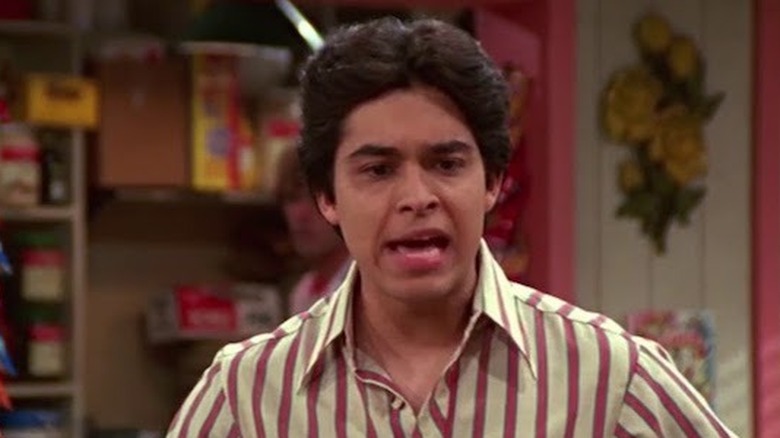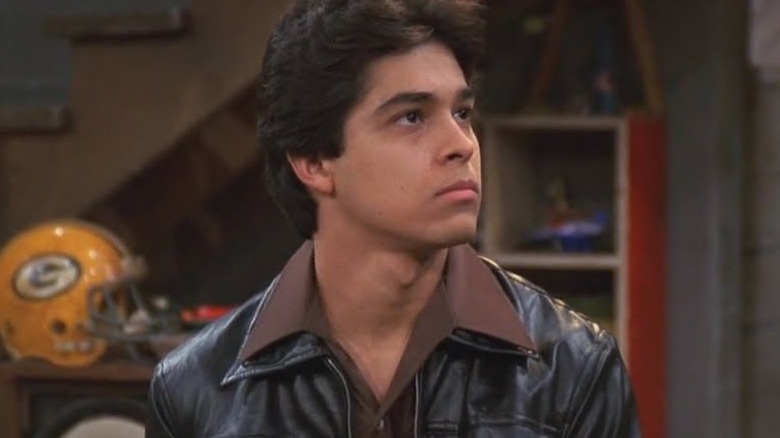Why Fez's Character From That '70s Show Did Not Age Well
There are a plethora of "classic" TV shows and movies from the 1980s, 1990s, and 2000s that — although popular at the time — wouldn't be considered anything close to a classic now. "The Monster Squad" is one of the most famous kid-friendly monster movies from the late '80s, yet it is full of homophobic slurs and sexist slut-shaming. "Entourage" was one of HBO's most successful shows at the time; it was also the embodiment of the Chad-esque playboy lifestyle, encompassing a multitude of behaviors that contributed to the #MeToo movement in its own small way. And then, there was "That '70s Show."
What people loved most about "That '70s Show" were the copious levels of (implied) cannabis consumption, Eric (Topher Grace) and Donna's (Laura Prepon) role reversal in their relationship, a young Ashton Kutcher as the good-looking, dim-witted Kelso, Red's (Kurtwood Smith) tough, no-nonsense attitude, and the masterful passive-aggressive subterfuge that gave Kitty (Debra Jo Rupp) self-empowerment in an era where women had very little of their own agency.
But there were also a lot of problematic tropes and storylines in "That '70s Show" that have not aged well. These days, we live in a more mature, enlightened society, one which has moved past finding such humor funny or entertaining (for the most part, at least). And the character of Fez (Wilmer Valderrama) has arguably aged much worse than other aspects of the show. Why, you ask? Well, there are lots of reasons. And here are the most glaring ways in which Fez has not aged well since "That '70s Show" wrapped.
Fez was a catch-all excuse to make every racist joke in the book
The name "Fez" has a double meaning within the context of "That '70s Show." For starters, a fez is a traditional hat worn by Muslim men. And by "traditional," we mean it's about as much of a caricature of Muslim culture as the conical hat (via NBC News) is for Asians. The other meaning — which is more explicitly stated by the other characters — is that it's a nickname/acronym for "Foreign Exchange Student," which his friends had to give him because they couldn't pronounce his real name.
Of course, Fez was a foreign exchange student. After all, what other reason could there be for a young brown man with a "funny" accent to be in largely white, Christian, English-only Suburbia, USA? He certainly couldn't have been born there, and since the United States was considered the world leader at the time, what eager young student wouldn't want to travel to a "superior" country in order to get a good education? The sarcastic quotation marks are there for a reason, by the way. In a nutshell, Fez's entire existence was based on unflattering racist stereotypes.
On top of that, the writers left his ethnicity and nationality vague on purpose, per Screen Rant. Sure, you could argue that they were piggybacking off of similar comedic character ambiguities for the sake of a laugh (like the old "It's Pat" skits on "Saturday Night Live"). But if you look at the broad spectrum of race-based jokes that Fez was either the butt of or contributing to, it can also be said that they left his origins a mystery so that they could maximize the amount of stereotype-based wisecracks they could milk from his character.
Fez would get #MeToo'd so fast, his head would spin
Fez's character was basically libido incarnate wearing a human suit. All he could think about was how to get laid. No female was off-limits in his eyes, including the girlfriends of his best friends. He was so horny he could barely see straight, and his predatory behavior was consistently treated as a "joke" — as if he weren't one spiked drink away from becoming a sex offender.
But the most egregious example of Fez's inappropriate behavior on "That '70s Show" took place in the Season 7 episode "2000 Light Years From Home." Here, Fez offers to help a relationship-weary Kelso break up with his girlfriend by having sex with her in a dark room. Horrifying as it sounds, it's laughed off like it was just a silly joke.
Just think about what would have happened to that young woman if Kelso had agreed to Fez's idea instead of dismissing it. The lights flick on, and there she is, being intimate with someone she never consented to be with. At the same time, her "infidelity" is "discovered" by the man she thought she was having sex with and, as confused and terrified as she already is, the man she loves uses the situation to shame her and break up with her.
That type of abusive gaslighting is arguably enough to give the classic 1940s film that inspired the term a run for its money. But is it a joke we should all laugh off, like many of the other racist, sexist, and generally problematic elements of Fez's character throughout the series? Funny or not, what he got away with back then would never be considered acceptable or entertaining today. And that's a good thing.


